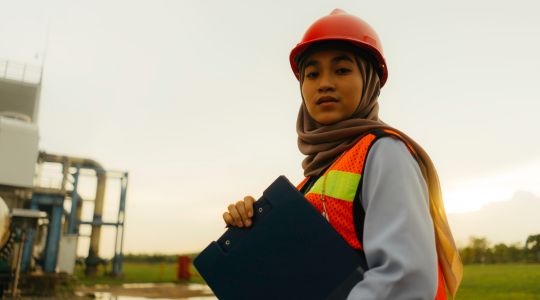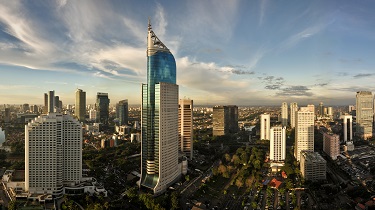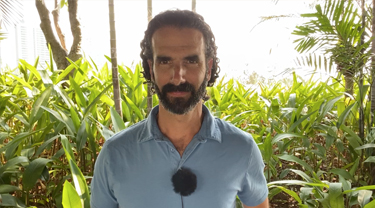
Indonesia infrastructure overview for Canadian exporters
Author details
Susan Redding
Senior international trade writer
In this article:
- Ambitious infrastructure plans seek to bridge gaps and boost growth
- Canada’s largest export market in Southeast Asia seeks new infrastructure players
- New strategic partnerships and access to financing pave the way for Canadian participation
- What are Indonesia’s infrastructure priorities?
- Infrastructure opportunities in Indonesia for Canadian businesses
- Indonesia infrastructure projects at a glance
- How can Canadian companies succeed in Indonesia’s infrastructure market?
- Understanding Indonesia’s regulatory landscape and protecting against risk
- Partner with EDC to build Indonesia’s future
- Interested in growing your business in Indonesia and the Indo-Pacific?
Indonesia’s infrastructure boom presents major opportunities for Canadian exporters in sectors like clean energy, digital infrastructure, and water treatment. With over $160 billion in planned projects and strong PPP frameworks, Canadian firms can leverage EDC’s support to enter this high-growth market.
Emerging markets across the Indo-Pacific are racing to close infrastructure gaps, but few ambitions match Indonesia’s.
Southeast Asia’s largest economy and most populous country—with 277 million people—has targeted IDR 1,905.3 trillion (about $160 billion) of infrastructure projects between 2025 and 2029, as it works towards its goal of 8% gross domestic product (GDP) growth by the end of this period, according to the Indonesia’s public works ministry.
“As one of the largest construction markets in Southeast Asia, Indonesia ranks as the eighth most attractive infrastructure market in Asia-Pacific and in 20th place globally,” says Nicolas Pawlonka, Export Development Canada’s (EDC) infrastructure sector lead for Indo-Pacific.
“Compared to other markets in the Indo-Pacific, Indonesia’s infrastructure initiatives are notable for their scale—with many large-scale mega-projects—as well as a strong emphasis on public-private partnerships (PPP),” Pawlonka says.
For Canadian companies that design, build, finance, or supply specialized equipment or technologies for infrastructure projects, Indonesia presents tremendous opportunities. The project pipeline is deep and diverse, including:
- 2,432 kilometres of new toll roads;
- dozens of green energy plants; and
- 77 other strategic initiatives announced recently by President Prabowo Subianto, who was voted into office in 2024.
At the same time, many of the state-owned enterprises that have historically been awarded most of the country’s construction contracts are under financial stress, he says. There are plans underway to consolidate this subsector from about 890 state-owned companies and their subsidiaries companies to around 200, according to Indonesian media reports.
“This opens up opportunities for international partners, including Canadians, with technology, capital and project management skills,” he adds.
Canada’s Indo-Pacific Strategy identifies Indonesia as a priority market. Indonesia is negotiating a free trade agreement with other members of the Association of Southeast Asian Nations (ASEAN) and has just finished negotiations on a bilateral Comprehensive Economic Partnership Agreement (CEPA) with Canada.
The two countries have been trading partners for decades. According to the Government of Canada’s overview of Canada-Indonesia relations, in 2024, Indonesia was Canada’s third-largest merchandise trading partner in Southeast Asia and largest export market in the region, with total merchandise exports to Indonesia valued at $2.3 billion. With agri-food accounting for most of Canada’s exports to Indonesia, infrastructure opportunities remain largely untapped—and waiting to be explored by the right companies.
“In Indonesia, there are fewer than 40 Canadian companies that have a physical presence, including just five or six large corporations and the rest small- or mid-sized,” says Sean Emmond, EDC’s chief representative in Indonesia.
“Among this group, only three—WSP Global, Hatch and Progesys—are engineering firms and they mostly serve the mining sector and not mainstream infrastructure. So, there’s definitely room for new market entrants,” Emmond says.
To help Canadian companies enter and grow in Indonesia’s burgeoning infrastructure market, EDC has planted local roots: An office in Jakarta and formal strategic partnerships with Indonesia’s flagship financiers.
One of these partners is PT Sarana Multi Infrastruktur (PT SMI), Indonesia’s state infrastructure catalyst and an early green bond issuer. In 2024, PT SMI joined forces with EDC in a partnership that linked its project-origination capabilities with EDC’s financing and vast network of Canadian infrastructure businesses.
“PT SMI brings thousands of shovel-ready PPP (public-private partnership) concepts—from mini-hydro to bus rapid transit,” explains Emmond. “EDC can finance in hard or local currency if there’s at least 20% Canadian content.”
EDC has also forged a strategic partnership with Indonesia Infrastructure Finance (IIF), a privately run finance company specializing in infrastructure-only, long-term financing (typically longer than 10 years). The EDC-IIF partnership enables the two organizations to co-finance projects that have Canadian content.
“Canada’s engineering talent and cleantech know-how are exactly what our program needs,” says Rizki Hasan, IIF’s president director and chief executive officer. “We have room for many more Canadian partners, especially in renewables, digital infrastructure and water.”
Recent and ongoing IIF-financed projects include the Central Palapa Ring—which aims to provide broadband coverage to underserved areas through an underwater fibre-optic cable system—two toll roads, three water-treatment plants and a seaport.
“IIF also has a strong advisory arm—a sort of consulting company that helps infrastructure transactions get ‘bankable,’” says Emmond. “We’ve already introduced a number of Canadian companies to that team, so they can shape projects in ways lenders will back. For example, we connected a Canadian renewables firm to IIF’s advisory group because IIF keeps a pipeline of projects where the Canadian company’s solutions could slot in.”

Under the new administration, Indonesia’s building priorities have shifted from hard infrastructure—like toll roads and airports—toward more people-centric development themes, while still emphasizing connectivity and energy. This shift will likely be reflected in Indonesia’s upcoming National Medium-term Development Plan 2025-2029, which is expected to provide a roadmap aligning infrastructure with economic and social development goals.
Idhan Harahap, managing director and chief investment officer at IIF, points to four key priorities in Indonesia’s infrastructure strategy and how these goals can translate to projects:
- Food security will require infrastructure support for agricultural logistics and distribution—for example, cold chains and rural transport—to improve self-sufficiency.
- Energy security, which Indonesia seeks to achieve by expanding its power capacity to 70 gigawatts (GW), with 60% from renewables such as solar, hydro, tidal and wind. While coal remains in the energy mix, there’s less emphasis on it, says Harahap.
- Digital infrastructure through development of telecommunications networks, data centres and satellite systems to support Indonesia’s digital economy goals
- Social infrastructure will be bolstered by building and upgrading hospitals, rural schools and housing, especially in underserved and remote regions.
Indonesia also continues to push forward with the relocation of its new capital, Ibu Kota Nusantara, albeit at a slower pace under the new administration. Analysis by global research firm, Fitch Solutions, found the five-year state allocation for the project was reduced by IDR 48 trillion for 2024-2028, down from IDR 78 trillion in 2020-2024, and private funding will be needed to bridge the gap.1
Fitch Solutions predicts an average of 6% year-over-year growth in Indonesia’s construction industry from 2024-2034, driven by a large industrial construction pipeline and strong residential construction growth.
Amid this building boom, Canadian infrastructure businesses can find opportunities in several areas:
- Port modernization and dredging. Indonesia’s drive to shorten shipping times and cut logistics costs (which currently represents 23% of GDP) demands North American-grade automation, cold chain and information and communications technology (ICT). Canadian consulting companies with port-planning software, dredging technology, or smart-terminal systems can partner with Indonesian state-owned enterprises, or global engineering, procurement and construction management (EPCM) firms already onsite.
- Clean and baseload renewable power. Hasan says renewables already represent close to one-quarter of IIF’s loan book and continue to be the organization’s top priority. Canadian cleantech firms interested in market diversification opportunities should look to Indonesia, where energy goals focus heavily on a diversified renewables portfolio that include:
- Hydropower: Indonesia aims to bring capacity to 9.8 GW by 2034 while having a total hydro potential approximated at 75 GW. Canadian equipment suppliers and engineering, procurement and construction management firms (EPCM) are well placed because “hydro plays to Canada’s engineering DNA,” says Pawlonka.
- Geothermal: Existing potential resources exceed 28 GW, but only 2.7 GW is operational. IIF’s chief investment officer, Idhan Harahap, says that 60% of the 70 GW power build will be renewables, with geothermal central to baseload needs.
- Solar and storage: Floating photovoltaic systems at Cirata and Batang set the template for additional 50- to 200-megawatt arrays using battery or pumped-storage solutions—technologies where Canadian suppliers excel.
- Water and wastewater treatment. Projects in Pekanbaru, Bandar Lampung and Umbulan use design-build-finance-operate structures, often with viability gap funding from PT SMI. Related construction and engineering services, as well as specialized equipment like membrane filtration systems, SCADA (supervisory control and data acquisition) and leak-detection equipment are in demand.
- Digital infrastructure. Data centre capacity in Indonesia has quintupled since 2020 and fibre-to-home rollouts continue. A landmark EDC-backed, Indonesian rupiah loan enabled Nokia to supply optical gear to an Indonesian company—EDC’s first local currency deal and a model for more to come.
- Social mega-projects outside Java. The new administration prioritizes food and energy security, hospitals and vocational schools in Indonesia’s eastern provinces. Canadian EPCM firms, like WSP, Hatch and Progesys, already serve mining clients there; similar professional services are sought for hospital and school public-private partnerships.
The table below provides a snapshot of Indonesia’s planned investments in infrastructure:
| PROGRAM CATEGORY | PROGRAM HIGHLIGHTS | BUDGET OR SCALE | |
|---|---|---|---|
Roads and bridges |
• Trans-Java and Trans-Sumatra toll roads • Ring roads for secondary cities |
1,500 km new toll roads by 2030 | |
| Port and logistics | • Sea tolls to connect 17,000 islands • Patimban deep-sea port • 24 commercial seaports to be modernized |
$60 billion (IDR 700 trillion) | |
| Mass transit | • Jakarta East-West MRT • Bali Urban Subway • Rail upgrades beyond Java |
>$34 billion pipeline | |
| Energy transition | • 65 gigawatts of new capacity by 2034: 60% renewable (solar, geothermal, hydro) and 1.2 million tonnes per annum floating liquefied natural gas | $95 billion power build-out | |
| Water and social infrastructure | • More than 20 water treatment public-private partnerships, hospitals, schools, rural broadband | $21 billion (IDR 250 trillion) planned | |
Canadian companies looking to explore infrastructure opportunities in Indonesia should take the time to understand not only the market potential of Indonesia, but also the country’s business culture.
Emmond notes there’s a “massive emphasis” on relationships in Indonesia. “Face time is important,” he says. “One local executive has even joked that you need to know the names of your potential business partner’s kids before you can sign a contract.”
To ease their entry into the Indonesian market, Canadian businesses should:
- Come early and come often. Deals rarely close after a single visit, so Canadian businesses need to budget time and money for repeated in-person meetings and social interactions to build trust and show commitment.
- Identify a local champion. Partnerships with state-owned enterprises, or regional conglomerates that already hold concessions, can remove barriers to entry and potentially lead to cost savings.
- Connect with Indonesia-focused business organizations. Harahap says business organizations such as chambers of commerce can provide a good starting point for connections to the business community in Indonesia. In Indonesia, a well-established national chamber of commerce is Kadin Indonesia. In Canada, there’s the Canada Indonesia Chamber of Commerce.
- Translate your documents. While English is spoken widely in Indonesia, getting your marketing material and other business documents translated into Bahasa, the local language, can go a long way towards establishing trust and nurturing relationships.
- Embed ESG compliance into your offerings. Indonesia is increasingly pushing for more robust environmental, social and governance standards—a position underlined in 2023 with a memorandum of understanding between the Indonesia Stock Exchange and the International Finance Corporation (IFC), which developed ESG performance standards for businesses. Canadian companies that want to enter Indonesia’s infrastructure sector and obtain investor funds need to understand and align with IFC performance standards or other global sustainability benchmarks. Indonesia’s state-owned electricity company, for one, recently updated its environmental and social management system to include international standards such as the World Bank Environmental and Social Framework.
Emmond describes Indonesia’s business landscape as “highly regulated,” with approval processes that are often complicated—in some cases, spanning multiple levels of government. Consequently, Canadian businesses will need to budget for costs, time and in-country effort to obtain certain permits.
Companies should also ensure they understand the rules related to local content, like Indonesian majority ownership or minimum local sourcing requirements. You should also be alert to potential compliance risks and conduct proper integrity due diligence before entering into agreements with external parties such as agents and project planners.
Stringent “know your counterparty” procedures are essential to ensure potential partners, agents and suppliers have programs and policies in place that align with environmental, social and governance best practices, including credible and effective compliance measures. These should cover anti-bribery and corruption, conflicts of interest and business integrity for a range of transaction elements, including project tenders and third-party vendor selection. Find out, for example, if there are clear rules around engaging with third parties—like government officials or existing vendors—who might unduly influence the tender process. Do the research to ensure commercial agreements include integrity clauses.
Pawlonka notes that EDC can help Canadian businesses navigate Indonesia’s regulatory landscape through due diligence on potential partners, supplier matching programs, market entry intelligence and referrals to reputable professionals such as lawyers and accountants.
You should also check out
EDC interactive tool delivers economic insights on Canada’s Top 75 trading partners.
Indonesia’s infrastructure decade is underway, powered by a government-led, public-private partnership model and supported by an infrastructure-focused financial framework. With on-the-ground representation, strategic alliances and flexible financing for Indonesia infrastructure projects in rupiah or hard currency, EDC is ready to help Canadian infrastructure firms connect, structure and protect their Indonesian projects.
As part of our Indo-Pacific strategy, EDC is committed to helping Canadian companies diversify into new markets and succeed in this dynamic region. Discover how EDC’s financial and knowledge solutions can help you understand the opportunities in your target market and make exporting less risky. Visit EDC’s Export Help Hub, or subscribe to EDC’s Trade Insights newsletter for the latest updates.
Connect with EDC and watch your business flourish on the international stage.
Answer a few questions about your company to learn more about how EDC can help you plan, connect and fuel your expansion in the Indo-Pacific.














